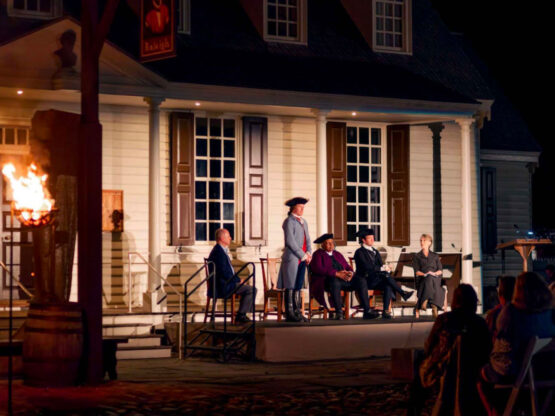From Colonial Williamsburg's '"Trend & Tradition" magazine.
The Williamsburg Institute, a collaboration between leaders of Colonial Williamsburg and William & Mary, held its first public program in October with a discussion at the Raleigh Tavern that featured portrayers of three 18th-century leaders - Thomas Jefferson, James Madison and the Rev. Gowan Pamphlet.
The Institute's offerings include immersive programming aimed at three groups: high school seniors and college undergraduates seeking leadership skills; business professionals and community leaders navigating the challenges ofleadership in a rapidly changing world; and lifelong learners interested in exploring the rich history and principles of American leadership.
"The Williamsburg Institute is a first-of-its-kind and unique learning organization," said Chris Caracci, the Institute's executive director. "With Williamsburg as its context, it will act as a bridge connecting our rich historical leadership heritage to both the present and future, informing the way for more effective leadership and civic engagement."
Caracci said programs will take place in Williamsburg because that is where American representative government was born.
In keeping with the Institute's goal of educating and preparing individuals for effective leadership while promoting civic engagement, the portrayers of the two presidents and the minister discussed, among other subjects, the nature ofleadership, both then and now. Theywere interviewed by Carly Fiorina, the Institute's executive chair. Fiorina also serves as chair of The Colonial Williamsburg Foundation Board of Trustees and as the national honorary chair of the Virginia American Revolution 250 Commission.
Fiorina asked each of the leaders to define leadership.
Madison, as portrayed by Bryan Austin, stressed that when you are called to do something, "it may not be to stand as president of the United States, it may be to show up on Election Day, advocate for your neighbor, enlighten yourself, change your mind."
Pamphlet, portrayed by James Ingram, led a congregation that included enslaved and free Black people in the 18th century. He said that role sparked fears that he might be hanged for his preaching, adding: "You have to look at the only one that's going to see you through, and that's our Father, God in heaven."
Jefferson, portrayed by Kurt Smith, stressed that leaders understand that they do not choose themselves but are chosen by the people around them. "We choose them," he said, "and if they do ill, it is up to us to mitigate that ill, to choose new leaders."
The Institute, Fiorina said, will play a critical role "in education and preparing individuals to lead, solve problems, engage with others and advance society. Now more than ever, particularly as we approach the 250th commemoration of our founding as a nation, we need leaders who will create a more effective, engaged, civil and inclusive society."
The Williamsburg Institute's board of directors includes Cliff Fleet, president and CEO of The Colonial Williamsburg Foundation; Jeff Trammell, former rector of William & Mary and former member of the William & Mary Board of Visitors; Peggy Agouris, provost of William & Mary; Mike Todd, executive vice-president - finance and administration of William & Mary, Kendrick Ashton, co-founder and co-CEO of The St. James and member of the William & Mary Board of Visitors, and Pamela Penny, member of William & Mary Foundation board.
For more information on the Institute, visit williamsburginstitute.org.


